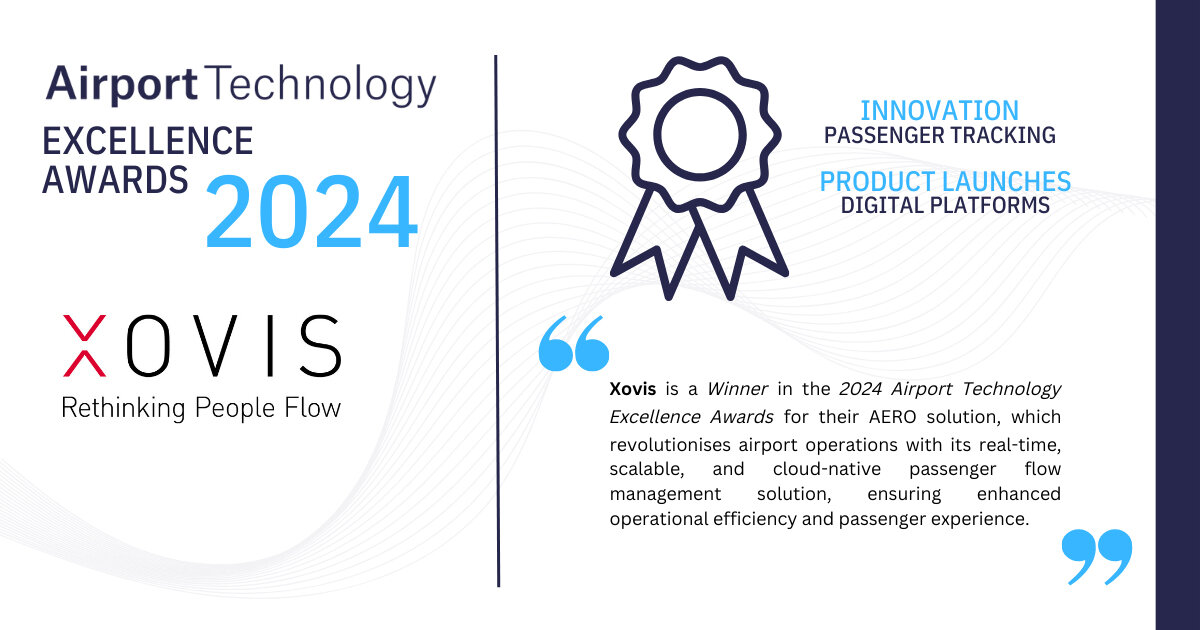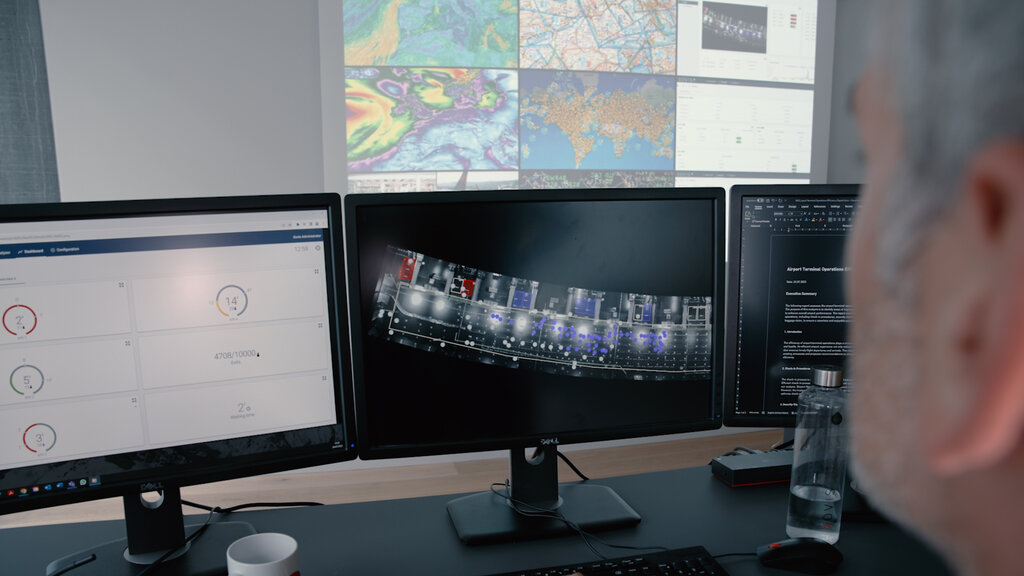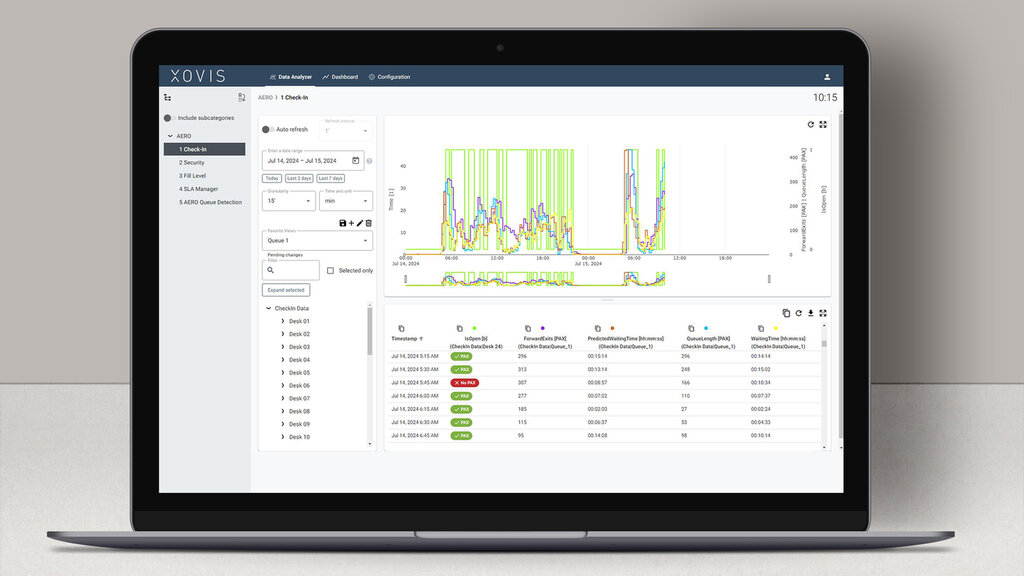IN FOCUS Excellence Awards Interview
Sponsored by Xovis
Airport Industry Review Excellence Awards 2024: Xovis
Christian Studer, co-founder and CEO of Xovis, delves into the transformative capabilities of AERO, the company's cutting-edge, cloud-native solution designed to improve airport operations.

Airport Industry Review: Xovis has developed a strong reputation for its on-prem, sensor-based Passenger Flow Management System (PFMS). What is different about AERO, the company's cloud-native, fully managed service?
Christian Studer: AERO is designed to provide customers with a stable platform to quickly implement updates and improvements without disrupting operations. It is the result of over ten years of working closely with airports and the platform for the machine-learning-based solutions we are continually developing.

Christian Studer, co-founder and CEO at Xovis.
Because AERO is a fully managed service, Xovis can ensure the system is highly available – from the technical side to KPIs. Automatic detection with AERO preserves data accuracy by ensuring that operations don’t interfere with a configuration, which can become outdated as layouts change. AERO keeps operators informed of changes and what measures should be taken to ensure accuracy.
Airport Industry Review: Does AERO give airport operators an advantage with decision-making compared with an on-prem PFMS?
Christian Studer: Accurate, real-time data captured by our purpose-built 3D sensors is a common feature for AERO and on-prem. What’s changed with AERO is the more advanced functionalities and the speed and efficiency with which we can deliver new features and updates.
Also, because of proactive monitoring and data sanity checks, AERO users don’t have the associated cost or concern about service disruptions or about keeping a specialized IT person available to help with updates – it’s all automated.
Airport Industry Review: How does AERO's cloud-native architecture and automated updates reduce the total cost of ownership for airport operators?
Christian Studer: As a fully managed service, airport operators no longer need specialised staff to look after the on-prem service. And that person does not have to block a day or two to complete an update. All updates and all new features are delivered automatically with virtually no disruption to service. New airport customers also realise significant savings by avoiding server infrastructure costs.

New solutions being deployed on AERO are also major cost-savers. One example is AERO Queue Detection, our ML-based solution that automatically detects queues – even in highly complex environments – and self-adjusts to changes in layout in the queuing environment.
AERO can automatically detect all queuing levels, regardless of complexity, and automatically and precisely reconfigure that space each time there is a change. That’s huge in terms of saved resources. Operators can use those preserved resources to increase revenue or limit other costs.
Airport Industry Review: What are some examples of how AERO's scalability has allowed airports to adapt to changing passenger volumes and infrastructure developments?
Christian Studer: AERO is ideal for scaling up and out. The AI-powered features, like AERO Queue Detection and others in the pipeline, can be scaled up as soon as they are market-ready. But AERO also makes it easier to grow coverage across terminal touchpoints.
Many of our customers start with an entry use case at particularly problematic touchpoints – for example, security or check-in – but then want that same rich data from other areas in the terminal. They might want to see what passenger flow looks like around retail areas or lounges to make layout improvements or to help concessionaires with scheduling. With AERO, we can expand coverage much faster.
Airport Industry Review: How has the implementation of AERO impacted the operational efficiency of airports that have deployed it, particularly in Europe and the Americas?
Christian Studer: In Luxembourg and Montevideo, two recent AERO onboardings, we saw similar motivations: the need for a solution that could help with data management challenges and deliver super accurate real-time data. With AERO, we’ve helped both manage passenger flows and provided insights about how our system and other systems are functioning. This is a big value for systems specialists at airports big and small, information that can be used to improve operations.
Airport Industry Review: How does AERO ensure passenger data privacy while providing detailed flow management?
Christian Studer: AERO and our on-prem solution are fully GDPR compliant because the sensors supporting those systems are edge processing devices that neither capture nor transmit any non-numerical data. Data from the sensor is only communicated in coordinates, not images. Xovis stereovision sensors don’t capture images or video, nor do they collect passengers' personal or biometric data.
Airport Industry Review: Can you discuss the feedback received from airport operators regarding the impact of AERO on passenger satisfaction and non-aeronautical revenue generation?
Christian Studer: Some of the 110 airports using our solutions have carried out studies that confirmed what most already know: Happier passengers, passengers with more time to browse, tend to consume more. Our solutions are all about removing stress-filled friction points from the terminal experience. This keeps passengers calm and ensures they have time to check out airport concessions, which is a top priority for operators.

Airport Industry Review: How does Xovis' full implementation service, including user training and ongoing support, contribute to the seamless integration of AERO into airport operations?
Christian Studer: AERO is our one-stop-shop solution. It covers design, manufacturing, implementation, maintenance, support, and training. We’ve developed that approach over ten years of working closely with airports, developing the know-how and best practices our competitors just don’t have. So, when an airport wants a seamless solution, from integration to support, they tend to opt for a provider that knows the ins and outs of terminal operations.
Airport Industry Review: Xovis is a Swiss company. How does that influence its products and services?
Christian Studer: We are a proud Swiss company totally comfortable with all the stereotypes that entails – chocolate, skiing, raclette, and, of course, quality and precision. Everything we do, from sensor manufacturing to software development, is done in Switzerland according to rigorous standards to ensure it meets the high quality expected of a Swiss product.
Airport Industry Review: Looking ahead, what are Xovis' plans for further innovation and development of AERO to meet the future needs of the dynamic airport sector?
Christian Studer: There are some very exciting things in the AERO pipeline. We just rolled out a tool operators can use to measure compliance with Service Level Agreements (SLAs) and a heatmap solution that identifies terminal hotspots will be released in the coming months.
These are two features for airport operators interested in effectively monitoring the performance of third-party service providers and optimising layout to improve non-aeronautical revenue. We will continue to invest in solutions that will address market demands now and into the future, as we've done since the beginning.
Contact information
Xovis AG
HQ Switzerland
Industriestrasse 1
3052 Zollikofen
Switzerland
Tel.: +41 32 342 04 70
Email: hello@xovis.com
Web: www.xovis.com
